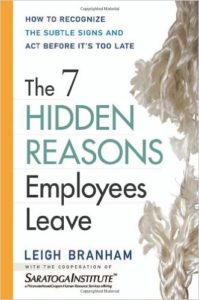 We recently ordered a book titled The 7 Hidden Reasons Employees Leave, by Leigh Branham. Because of our work as workplace mediators, this is an important topic that we deal with on a daily basis. The book is based on in-depth analysis by the Saratoga Institute of data gathered from exit interviews. The data suggests that the seven most common reasons for employees leaving are:
We recently ordered a book titled The 7 Hidden Reasons Employees Leave, by Leigh Branham. Because of our work as workplace mediators, this is an important topic that we deal with on a daily basis. The book is based on in-depth analysis by the Saratoga Institute of data gathered from exit interviews. The data suggests that the seven most common reasons for employees leaving are:
1.The job or workplace was not as expected.
2. A mismatch between the job and the person.
3. Too little coaching and feedback.
4. Too few growth and advancement opportunities.
5. Feeling devalued and unrecognised.
6. Stress from overwork and work-life imbalance.
7. Loss of trust and confidence in senior leaders.
As workplace mediators, we recognise all of the above as reasons why employees are unhappy and disengaged at work and ultimately may end up leaving an organisation. However, what strikes me as I read this book is that there is very little mention of workplace conflict as a contributing factor to employees leaving. This is very different to our experience of working in the field of workplace mediation for more than 10 years. We find that most employees involved in mediation, conflict coaching or conflict management training, cite workplace conflict as a reason why they would consider or have already left an organisation.
Point 6 (stress from overwork and work-life balance) does mention conflict. Branham lists overwork, personality conflicts, forced overtime disorganised supervisors, gossip, harassment and prejudice as some of the reasons employees feel stressed at work. However, I would ague that workplace conflict plays a more prominent role than that – we see it is a major contributing factor to employees looking for other work. It may be that the other factors, such as point 5 (feeling devalued and unrecognised) or point 7 (loss of trust and confidence in senior leaders) either start or perpetuate a conflict. I.e. if we feel devalued and unrecognised, or if we don’t trust our manager, we are more likely to find ourselves in a difficult and potentially conflictual relationship. However, the end result is often played out as workplace conflict.
Human relationships, inside and outside of work, are complex. And it is often this complexity that results in miscommunication, different perceptions, relationship breakdowns and conflict. As more and more research is done into the field of destructive workplace conflict, this will become clearer. And we may find that there are indeed eight hidden reasons why employees leave.



